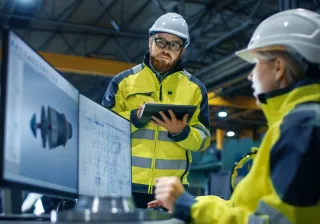Could the industrial sector be almost emission-free? Will factories be located near the people and will they manufacture products tailored to customers’ needs? Will the production be steered remotely?
At the beginning of 2020, I began working as Professor of Practice at VTT with an aim to boost the reform of the industrial sector. In my task, I will focus on new ambitious initiatives that will reshape the traditional industrial sector or generate novel fields of industry.
Since industry is the cornerstone of our society, both in terms of jobs and export income, this is an important matter with a view to the economy and welfare of Finland. On the other hand, due to climate change and resource scarcity, the industrial sector is in need of a quick reform. In industry, it is important to make a shift to a circular economy and to implement the principles of sustainable development, and this must be done on the terms of competitiveness. The topical questions include:
- Is industry capable of responding rapidly to a crisis or otherwise changing demand, or anticipating market changes? Will Finnish enterprises find totally new business opportunities in the changing markets and evolving modes of operation?
- Will companies be able to share knowledge in real time and automatically optimise their supply chains?
- What kind of durables will be needed in the first place, and how can they be designed efficiently? Could new kinds of products be made using additive manufacturing methods or by growing them by means of synthetic biology?
What kind of operators will come out as winners?
Digitalisation is the enabler of this revolution. A shift to data-based business will eliminate some old operators and intermediaries but also create new ones. Even the old operators may find a better role for themselves on the market by renewing their operations. In case of disruption, we need rapid data-based decision-making capacity and understanding of the complex interactions in the supply network. Transparent networks help us anticipate changes and improve our risk management capacity. In the future, customers and users may also participate in the design of products and services or manufacture them themselves. In design, the lifecycle efficiency and durability of solutions is assessed, and their recyclability is maximised.
Production chains develop towards self-managed networks that anticipate product-market fit, share information and optimise the use of resources. The logistics of factories and supply chains become automatised and new, distributed mobile concepts may arise. High rate of automatisation, flexible human-robot collaboration and the start of a new AI era will reduce the dependence of industry on employee expenses. Industrial work will evolve towards specialist work, requiring continuous training and support from the developing work community. In the end, an ecosystem that can manage all this, fully exploit digitalisation, and understand and activate the final users will come out as a winner.
Finland meets all the conditions of success
Finland has a very strong traditions in the export industry, an open innovation environment and atmosphere, and excellent competence – in other words, all the keys to success! But the transition is huge, and no one can turn it into opportunities and business activity without collaboration. To ensure the competitiveness and sustainable development of the industrial sector, we at VTT bring together the strengths of experts from various fields and inspire also our customers and stakeholders to join in.
In addition, I am in a position to yield influence on national and European industrial strategies: I am a member of the working group on the national digitalisation strategy for industry coordinated by the Ministry of Economic Affairs and Employment, chair of the EU Factories of the Future Public Private Partnership Board and a member of the board of directors of the European Factories of the Future Research Association. In addition, I am also coordinating a joint project with 19 European partners in which we are specifying digitalisation needs and paths in the manufacturing industry. These are excellent forums to influence issues of vital importance for the reform of the European and Finnish industries.
By combining international and national actions, we may target research in a way that best benefits our industry. I hope that, for my part, I can identify the objects with the highest potential to affect the industrial competitiveness and sustainable development and help launch visionary ecosystems around them that will generate new international business.





